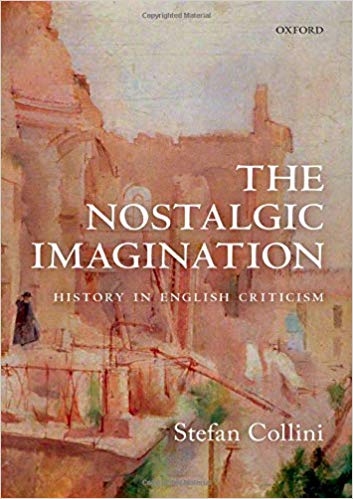
During his analysis of William Empson’s The Structure of Complex Words, Stefan Collins writes: “At first meeting, the book can seem deliberately uninviting. One way to describe its structure would be to say that an outer ring of barbed wire surrounds an inner ring of ditches…at the heart of which there is a labyrinth.” (p. 116). If you enjoy this kind of snarky academic writing, you’ll enjoy The Nostalgic Imagination. Stefan Collins writes about both English history and major critics like F. R. Leavis, Q. D. Leavis, Richard Hoggart, Raymond Williams, and T. S. Eliot.
Of course, these people and their criticisms of English Literature are mostly forgotten now. We’ve moved on to obsessing over cat videos and the Kardashians. Collins captures a time when books were taken seriously and literary criticism was an honored profession. If you’re nostalgic for more serious and sensible times, The Nostalgic Imagination will meet you half-way. GRADE: B+
TABLE OF CONTENTS:
Introduction p. 1
1 Whig History and the Mind of England p. 25
2 Scrutinizing the Present Phase of Human History p. 48
3 Science and Capitalism as ‘Background’ p. 77
4 Rationalism, Christianity, and Ambiguity p. 102
5 The History of ‘the Reading Public’ p. 126
6 The Long Industrial Revolution p. 156
7 Literary History as Cultural History p. 183
Postscript p. 207
Notes p. 211
Index p. 235
Well…criticism is still taken relatively seriously…and the degree to which it’s conmingled with marketing is no less than in the previous century…but the audience that interested in it is less likely to find it as easily and consistently as they might’ve in, say, 1950…most of the better magazines for it are folded or doing less well than they did, financially and the websites which play a similar role are a little easier to gather but harder to corral.
I’ll go look for this.
Todd, you’ll enjoy Stefan Collins’s knowledge and witty writing style.
And, of course, taking the New Critics or Deconstruction too seriously, even religiously, was always a mistake, as opposed to using the methods they developed to see what they got one, as opposed to insisting they were the Only Valid Means of Approaching Literature. A bit like the social sciences feeling the need to drown themselves in mathematics to prove to Somebody (mostly the social scientists themselves) that their work was Rilly Rilly Science After All.
Todd, the New Critics thought their approach had aspects that were rational and “scientific” which made it more valid than other critical techniques. Wrong!
Deconstructionists took and take much the same tack.